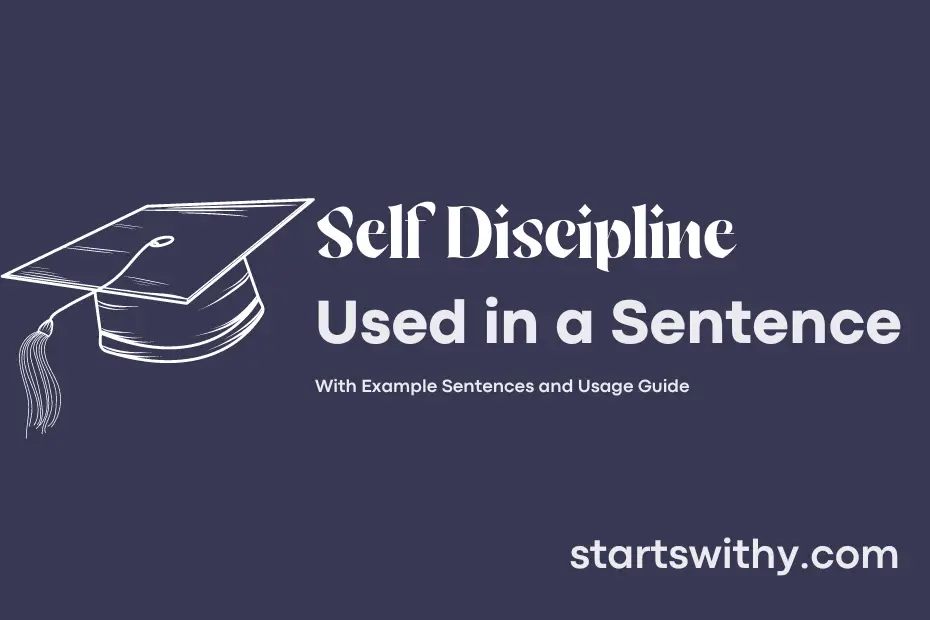Self-discipline is the ability to control one’s impulses, emotions, and actions in order to achieve a specific goal. It involves setting clear objectives, resisting distractions, and staying focused on the task at hand.
Developing self-discipline can lead to improved productivity, better time management, and overall personal growth. It plays a crucial role in achieving success in various aspects of life, such as work, school, relationships, and personal development.
7 Examples Of Self Discipline Used In a Sentence For Kids
- Self discipline helps me focus on my studies.
- I practice self discipline by finishing my homework on time.
- Self discipline means following rules and being respectful.
- I show self discipline by listening to my teachers in class.
- Self discipline allows me to make good choices.
- I use self discipline to stay organized and tidy.
- With self discipline, I can achieve my goals.
14 Sentences with Self Discipline Examples
- Self discipline is essential for managing your time effectively and avoiding procrastination in college.
- Developing a routine and sticking to it can help you improve your self discipline.
- Setting specific goals and deadlines for assignments can test your self discipline.
- Self discipline is necessary for resisting distractions like social media while studying.
- Planning your study schedule in advance requires a high level of self discipline.
- Prioritizing your tasks based on their importance can help you cultivate self discipline.
- Avoiding last-minute cramming by practicing consistent study habits will enhance your self discipline.
- Attending all your classes regularly reflects your level of self discipline.
- Regular exercise can improve your focus and boost your self discipline.
- Waking up early and maintaining a healthy lifestyle are signs of good self discipline.
- Avoiding overspending and managing your finances responsibly requires self discipline.
- Resisting the temptation to skip classes demonstrates your commitment to self discipline.
- Setting boundaries with friends and prioritizing your academic responsibilities shows your dedication to self discipline.
- Taking breaks and staying motivated throughout the semester can be challenging without a strong sense of self discipline.
How To Use Self Discipline in Sentences?
Self Discipline involves training yourself to control your impulses, emotions, and behaviors in order to achieve your goals. To use Self Discipline effectively, start by setting clear and realistic goals for yourself. Next, create a daily routine or schedule that helps you stay focused on your objectives. Remember to prioritize tasks based on their importance and work towards completing them one by one.
One important aspect of Self Discipline is learning to say no to distractions and temptations that may hinder your progress. Practice avoiding procrastination and staying committed to your tasks even when faced with difficulties. It is also important to hold yourself accountable for your actions and track your progress regularly.
In moments of struggle, remind yourself of the reasons why you started this journey and stay motivated to keep pushing forward. Stay consistent with your efforts and do not be too hard on yourself if you make mistakes along the way. Self Discipline is a skill that can be developed over time, so be patient with yourself as you continue to work on it.
By mastering Self Discipline, you will be able to overcome challenges, stay focused on your objectives, and ultimately achieve success in various aspects of your life.
Conclusion
Incorporating self-discipline into daily routines is essential for personal growth and success. By committing to self-discipline, individuals can develop a strong work ethic, resilience, and focus that are crucial in achieving both short-term and long-term goals. For example, waking up early, setting specific tasks, and avoiding distractions are all actions that demonstrate self-discipline and lead to greater productivity and fulfillment.
Self-discipline is a skill that can be cultivated through consistent practice and dedication. It empowers individuals to overcome procrastination, stay motivated, and persevere through challenges, ultimately paving the way for progress and accomplishment. By prioritizing self-discipline, individuals can enhance their performance in various aspects of life, whether in career advancement, personal relationships, or overall well-being.



